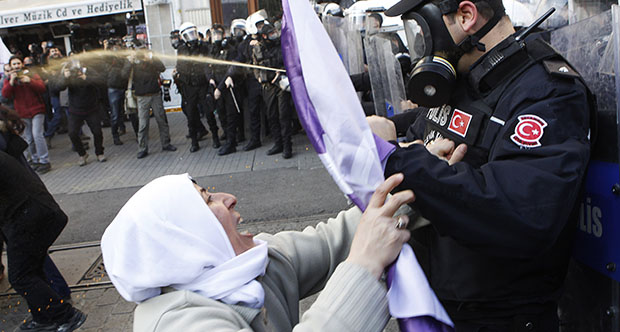 The Turkish government’s mounting domestic challenges, notably from the corruption investigation of senior officials that became public in December, may increase the risk that Prime Minister Erdoğan will be unable to complete a peace process he opened more than a year ago with Turkey’s Kurdish rebels. A failure of that reconciliation effort could increase the Kurdish complications for US policies in Turkey, Syria, and Iraq.
The Turkish government’s mounting domestic challenges, notably from the corruption investigation of senior officials that became public in December, may increase the risk that Prime Minister Erdoğan will be unable to complete a peace process he opened more than a year ago with Turkey’s Kurdish rebels. A failure of that reconciliation effort could increase the Kurdish complications for US policies in Turkey, Syria, and Iraq.
Last year was a tough one for Turkish Prime Minister Recep Tayyip Erdoğan. On top of a corruption investigation that threatens to envelop his Justice and Development (AK) Party government, and an increasingly open split with the influential cleric Fethullah Gülen, Erdoğan also faces the risk that one of one of his boldest initiatives, the so-called Kurdish Opening, will break down. A failure to achieve reconciliation with Turkey’s Kurds could lead to a resumption of violence within Turkey and complicate US efforts to manage the conflicts in neighboring Syria and Iraq.
Erdoğan’s initiation of peace talks with jailed Kurdistan Workers’ Party (PKK) leader Abdullah Öcalan in late 2012 was a brave but a risky political decision. While Erdoğan acted mostly because of domestic considerations, events across Turkey’s borders also increased pressure on Ankara to peacefully resolve its Kurdish problem. The war in Syria strengthened the Syrian Kurds’ push for autonomy, and the Kurdish Regional Government consolidated its position in northern Iraq.
While public enthusiasm for a resolution was at its height, the AK Party and Erdoğan began facing a series of escalating challenges that have diminished their authority and their political will to cut a deal with the Kurds. The AK Party’s crisis of authority began with the outbreak of mass protests in May over plans to replace Istanbul’s Gezi Park with a shopping mall. Heavy-handed attempts to suppress the protests compounded public anger, but the demonstrations eventually died down, and Erdoğan’s government actually sped up work on its latest democratization package, including an expansion of Kurdish rights.
Since December, though, the AK Party has faced a new problem, after police arrested more than 50 suspects in an investigation of bribery for government contracts. The suspects included influential businessmen, bureaucrats, and the sons of three cabinet ministers. Those ministers – of economics, interior, and urban development – resigned on December 25.
This crisis continues to deepen, as the government on January 7 removed hundreds of Turkish police officers, including officials responsible for intelligence and the investigation of fiscal and organized crime. Last week, Erdoğan declared that the corruption investigation was a plot against Turkey, telling his party loyalists that it “has surpassed all previous coup attempts and has been recorded as a betrayal to the state, democracy and the nation.”
The corruption investigations have exposed a simmering power struggle between the AK Party and the followers of Gülen, whom Erdoğan accuses of orchestrating the investigation from within the police and courts. Many of the sacked police officers are suspected of having Gülenist connections.
The AK-Gülen feud, coming just months before the first in a series of elections Turkey faces in 2014-15 (including a presidential election this August), has distracted the government’s attention from the flailing Kurdish peace process at a critical moment. Even before this feud broke into the open, the Kurdish reconciliation was in trouble. The PKK as well as the Kurdish Peace and Development Party say a package of reforms announced by the government in September does not go far enough. In addition to allowing the use of Kurdish in state schools (the government has only agreed to allow it in private schools), Kurdish groups want the government to abolish anti-terrorist courts that have been used to jail many Kurds without due process, amend anti-terror laws used to jail Kurdish activists who have not participated in violence, release prisoners jailed for PKK affiliation, and remove Öcalan from solitary confinement.
Erdoğan meanwhile has claimed that the PKK has not lived up to its commitment to withdraw its fighters from Turkey into northern Iraq. With Erdoğan and the AK Party increasingly under siege, chances of getting the Kurdish peace process back on track are diminishing—though, for their own reasons many Kurds would like the see the AK Party government survive, since, unlike most of its Turkish rivals, it acknowledges the need to keep talking.
Turkey’s internal turmoil is a headache for the United States. As the Erdoğan government has turned inward, Ankara has become less willing and able to support US initiatives in the Middle East than it was a year or two ago. A failure of the Kurdish reconciliation would make this situation worse. Though Washington has been careful to stay out of its ally’s negotiations with the PKK, it is concerned by the growing momentum for Kurdish autonomy in both Syria and Iraq. A failure of Turkey’s peace process could add to that momentum both within Turkey and without. The US government also worries that a failure of the Kurdish opening could further hobble Turkey’s political liberalization. As much as Washington would like the Kurdish opening to succeed though, it recognizes that US leverage can be effective only around the margins, and that it is up to Ankara and the Kurdish parties to get it back on track.
Jeffrey Mankoff is a fellow at the Center for Strategic and International Studies (CSIS) in Washington.
Müjge Küçükkeleş is a PhD candidate at the Institute for Middle East Studies at Marmara University in Istanbul.
They are 2012-13 alumni of the Atlantic Council’s Young Turkey/Young America Program.
Image: A pro-Kurdish demonstrator scuffles with riot police in Istanbul during a demonstration in January. REUTERS/Osman Orsal
